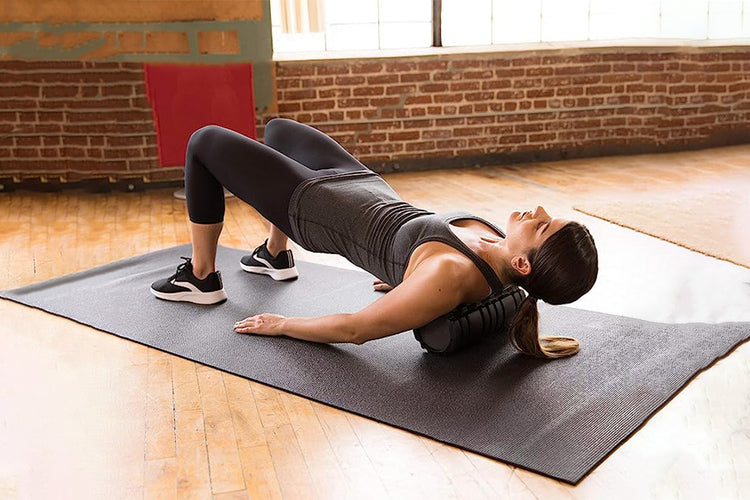Welcome to the fascinating world of workout recovery, where the physical and mental domains interlace to create a symphony of revival.
As we venture on this quest, let us delve into the often-overlooked extent of mental strategies that can improve your post-workout recovery experience.
While it's common knowledge that rest, nutrition, and stretching are vital for recovery, there's a hidden gem waiting to be discovered.
That is the remarkable connection between the mind and body. Incorporating imaginative and humane mental strategies into your recovery process can unlock a treasure trove of benefits that will elevate your well-being and propel you toward achieving optimal results.
Imagine that as you recover from a workout, your muscles will repair and replenish, and your mind will venture on a journey of peace, strength, and personal growth.
By boosting your mental landscape alongside your physical body, you will develop a harmonious symphony where recovery notes dance gracefully with the melodies of your thoughts and emotions.
So, let us embark on this expedition, where the boundaries between physical and mental dissolve, and the magic of recovery takes center stage.
Together, we will explore the secrets of mental strategies that can transform your recovery into a sublime experience of self-discovery.
Mindfulness And Meditation

One powerful mental strategy for enhancing workout recovery is mindfulness. Mindfulness is the practice of being fully present in the moment without judgment. It allows you to cultivate a heightened awareness and focus on the sensations in your body. By incorporating mindfulness into your recovery routine, you can experience numerous benefits.
Mindfulness helps promote relaxation and reduces stress, which is essential for optimal recovery. It allows you to tune in to your body's signals and better understand its needs. By being present and attentive, you can identify areas of tension or discomfort and address them effectively.
One technique you can try is mindful breathing. Take a few moments each day to focus on your breath. Pay attention to the sensation of the air entering and leaving your body. This simple practice can help calm your mind, regulate your heart rate, and promote relaxation.
Another powerful tool for mental and physical rejuvenation is guided meditation. Guided meditations can help you relax deeply, release tension, and promote healing.
There are various guided meditations available online that specifically target workout recovery. These meditations often focus on visualizing the healing process, directing positive energy to specific body parts, and promoting overall well-being.
Incorporating mental strategies like mindfulness and meditation into your workout recovery routine can profoundly impact your overall well-being. Not only will it enhance your recovery process, but it will also help you cultivate a more positive and balanced mindset.
Related Article: The Science of Muscle Recovery: How Much Rest Between Workouts for Muscle Growth?
Positive Self-Talk And Affirmations
In pursuing a healthy and fit lifestyle, we often focus on the physical aspects of our workouts and recovery. However, it's essential to recognize our thoughts and mindset's powerful impact on our overall mental well-being. This is where the practice of positive self-talk and affirmations comes into play.
By harnessing the power of our words and beliefs, we can enhance our workout recovery and create a more nurturing and supportive environment for ourselves. Positive self-talk involves consciously shifting our internal dialogue from self-criticism and doubt to self-encouragement and empowerment. It's about becoming our cheerleader, motivating ourselves with kind and uplifting words.
Conversely, affirmations are personalized statements reaffirming our positive qualities, goals, and intentions. When used consistently and sincerely, positive self-talk and affirmations can transform our mindset, boost our confidence, and accelerate our recovery process.
The Power of Positive Self-Talk
When it comes to workout recovery, positive self-talk can work wonders. Replacing negative thoughts with positive and uplifting statements can significantly improve recovery. Remind yourself of your strengths, resilience, and progress made, focusing on the bright side rather than dwelling on setbacks.
Challenging Negative Thoughts
Identifying and challenging negative thoughts and self-limiting beliefs is essential to promoting recovery. Recognize when negative thoughts arise and question their validity. Are they based on facts or merely assumptions? Replace them with more constructive and supportive thoughts that encourage healing and growth.
Crafting Personalized Affirmations
It would be best to compose affirmations tailored to your goals and aspirations to boost positive self-talk's impact. Try to create statements that resonate with you deeply, such as "I am strong, capable, and deserving of optimal recovery.”
Repeat these affirmations regularly. Make sure you imagine the manifestation and support a positive mindset that fuels your recovery journey.
Stress Management Techniques
In our fast-paced world, stress has become a familiar companion in our daily lives. When it comes to workout recovery, managing stress is crucial for promoting healing and rejuvenation.
Incorporating effective stress management techniques into your recovery routine can enhance your body's ability to bounce back and optimize your overall well-being. You should explore a range of stress management techniques that will help you relax, unwind, and facilitate a deeper level of recovery. Let's dive in!
Related Article: 8 Tips to Living More Fully in 2023: A Guide to De-Stressing & Mindfulness
Embracing Deep Breathing
Deep breathing exercises help activate the body's relaxation response, reducing stress and promoting recovery. Practice deep breathing techniques, inhaling slowly through your nose, allowing your abdomen to expand, and exhaling gently through your mouth.
As you do so, envision tension leaving your body, replaced by a sense of calm and tranquility.
Progressive Muscle Relaxation
Progressive muscle relaxation is a simple yet effective technique that involves tensing and relaxing each muscle group in your body. Start by tensing a specific muscle group, such as your hands, and then release the tension while focusing on the sensation of relaxation. Work your way through your body, from head to toe, promoting physical and mental relaxation that aids recovery.
Goal Setting And Planning
As you embark on your workout recovery journey, having clear goals and a well-structured plan can make all the difference. Goal setting and planning provide the framework for success. They will help you stay focused, motivated, and on track. It is the art of developing realistic and achievable recovery goals.
You can create a complete plan to guide you toward optimal rejuvenation. By using the power of goal setting and planning, you will pave the way for a successful and fulfilling recovery experience. Let's dive in and discover how to empower your recovery journey through strategic goal-setting and thoughtful planning.
Realistic And Achievable Recovery Goals
Forming realistic and achievable recovery goals is vital for keeping motivation and measuring progress. You should set specific and measurable goals, such as increasing flexibility, improving sleep quality, or reducing muscle soreness, tailoring them to your needs. Assess your fitness level and any injuries or limitations, and consult with professionals if needed.
Structured Recovery Plan
Work by creating a structured recovery plan containing different elements such as nutrition, rest, and regeneration. You should plan a schedule for dedicated recovery days, including active recovery exercises, stretching routines, or relaxing activities like yoga or meditation. By planning your recovery, you stay responsible for your goals and guarantee adequate time and resources are assigned for renewal.
Breaking Down Goals into Smaller Milestones
Try to break down your recovery goals into smaller milestones. This will help you maintain motivation and track progress. It would be best to celebrate each milestone achieved, no matter how small, as it symbolizes progress toward your highest objective.
This practice will allow you to stay motivated, equipping you with a sense of achievement during your recovery journey.
Social Support And Connection

Social support and connection cannot be undervalued when looking to enhance your workout recovery. While physical work and mental strategies play important roles, the motivation and companionship of like-minded people can make a world of difference.
It would help if you looked into the value of social support.
Dig into how building a network of supportive individuals and engaging in group activities can strengthen your recovery journey. By nurturing connections with others who share your passion for fitness and well-being, you can create a booming community that motivates and inspires you on your path to optimal recovery.
The Role of Social Support
The journey toward workout recovery can be challenging. However, having a strong support system can make a notable difference. Stay with like-minded people who understand and inspire your recovery goals. Try to communicate your challenges, successes, and experiences with them, as their support and empathy can be uplifting and motivating.
Building a Network of Like-Minded Individuals
It would help if you looked out for friends and fellows with a passion for fitness and recovery. Try joining local fitness groups, online communities, or fitness classes where you can join with like-minded individuals.
Trying to get busy with people on a similar path can provide a sense of fellowship, inspiration, and responsibility. With these friends, you can share your recovery journey, share tips, and show support to create a supportive and motivating network.
Engaging in Group Activities or Classes
You should participate in group activities or classes to cultivate a sense of community and improve your recovery process. Some of the things you can do are join group workout sessions, take yoga classes or other fitness-related activities. There are places where you can connect with others while focusing on your well-being. Getting busy in these activities will provide a social outlet and options for shared experiences and mutual growth.
Mental Strategies for Enhancing Workout Recovery
Workout recovery is essential to any fitness routine. However, it's not just about physical rest and rebirth. The mind also plays a decisive role in the recovery process.
You should prioritize rest, sleep, self-care, and relaxation. This way, you can create a holistic strategy for recovery that will satisfy both your mind and body.
Rest and Sleep
Rest and sleep are crucial for muscle repair, hormone regulation, and overall recovery. They allow the body to heal and rebuild after intense physical activity. It's good to understand that rest is not a sign of weakness but a necessary element of your fitness journey.
Establishing a Consistent Sleep Routine
Create a sleep routine that aligns with your body's natural circadian rhythm. Set a regular bedtime and wake-up time to regulate your body's internal clock and improve sleep quality. Aim for 7-9 hours of quality sleep each night.
Creating a Restful Environment
You should design your sleep environment to boost relaxation and peace. Try to keep your bedroom cool, dark, and free from distractions. Before bed, immerse yourself in calming activities like reading a book, practicing deep breathing exercises, or listening to soothing music to relax and prepare for restful sleep.
Related Article: Why is Sleep Important for Your Health?
Self-Care And Relaxation Practices
Self-care is essential for mental well-being and can significantly impact your workout recovery. Prioritize self-care without guilt or hesitation. You should schedule your time for activities that bring you joy and relaxation. You can take a nature walk, practice yoga, or spend quality time with loved ones.
Daily activities such as breathing exercises or yoga can be incorporated into your routine, even amidst a busy schedule, without needing a gym membership or expensive workout equipment. What you truly require is a top-notch yoga mat, like the lightweight and anti-tear yoga mat by DMoose.
Utilizing this mat during your yoga or breathing sessions, you can experience a profound sense of mental serenity, emanate positive energy, and achieve balance in every exercise. Furthermore, this mat provides optimal cushioning, preventing injury and enhancing your overall practice.
Exploring Relaxation Practices

Consider incorporating relaxation practices into your recovery routine. Treat yourself to a massage or practice self-massage using foam rollers or massage balls to release muscle tension. Experiment with aromatherapy using essential oils or soothing hot baths to ease muscle soreness and promote relaxation.
You can try Foam Roller For Back & Yoga exercises by DMoose. Designed with high-density foam, this versatile tool is suitable for individuals of all fitness levels, from seasoned athletes to beginners. Regardless of your experience, you can easily incorporate this foam roller into your routine and achieve remarkable results. Utilizing it can effectively alleviate pain, release muscle knots, and improve your overall muscle condition.
Nurturing The Mind And Body Through Hobbies
Hobbies and leisure activities give the mind a break and help in recovery. You should explore the activities that make you happy, like drawing, playing an instrument, or gardening. These activities help people be more creative, less stressed, and generally feel better.
FAQs
1. How much rest is required for post-workout recovery?
The rest required for workout recovery varies according to person and workout intensity. Generally, at least one to two days of rest each week are advised. If you feel tired or excessively sore, listen to your body and take extra rest days.
2. How long does it take for mental strategies to affect workout recovery?
The mental strategies' impact on workout recovery differs depending on the individual. Some people may experience immediate advantages such as reduced physical pain, greater sleep, and enhanced relaxation.
However, consistency is essential for long-term benefits and general well-being. After adopting these strategies into your routine, it may take a few weeks or months to see significant changes in your recovery.
3. Can mental workout recovery strategies improve general health and well-being?
Yes, mental strategies for post-workout recovery can improve general health and well-being. You may establish a balanced and comprehensive approach to recovery by prioritizing rest, sleep, self-care, and relaxation. This improves physical recovery, emotional well-being, stress reduction, and overall quality of life.
4. Can mental strategies help prevent workout-related injuries?
While mental strategies cannot directly prevent injuries, they can indirectly contribute to injury prevention. By improving focus, concentration, and body awareness, mental strategies can help you maintain proper form and technique and avoid reckless movements that may lead to injuries.
Conclusion
Putting workout repair first is essential for getting the most out of your workouts and ensuring long-term progress. Adding mental techniques like awareness, relaxation, and positive self-talk to your rehab routine can improve your health and help your body heal faster.
Mindfulness helps people in recovery to relax and feel less stressed. Breathing techniques and meditation can help you let go of stress and stay in the present moment. Visualization lets you imagine your recovery going well, which activates the mind-body link and speeds up the healing process. When you helpfully talk to yourself, you replace negative thoughts with statements and encouragement.
It's important to set reasonable goals and permit yourself to rest. Take advantage of rest days and active healing by doing light workouts that improve circulation without putting too much strain on your body. Feeding your body well-balanced food and drinking enough water helps your muscles repair and grow.
Using these mental tactics as part of your post-workout healing process is good for your body and mind. Accept their power, pay attention to your body, and respect the process of getting better. This method of healing will help you reach your exercise goals and improve your health as a whole.














